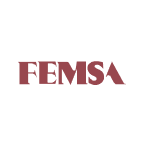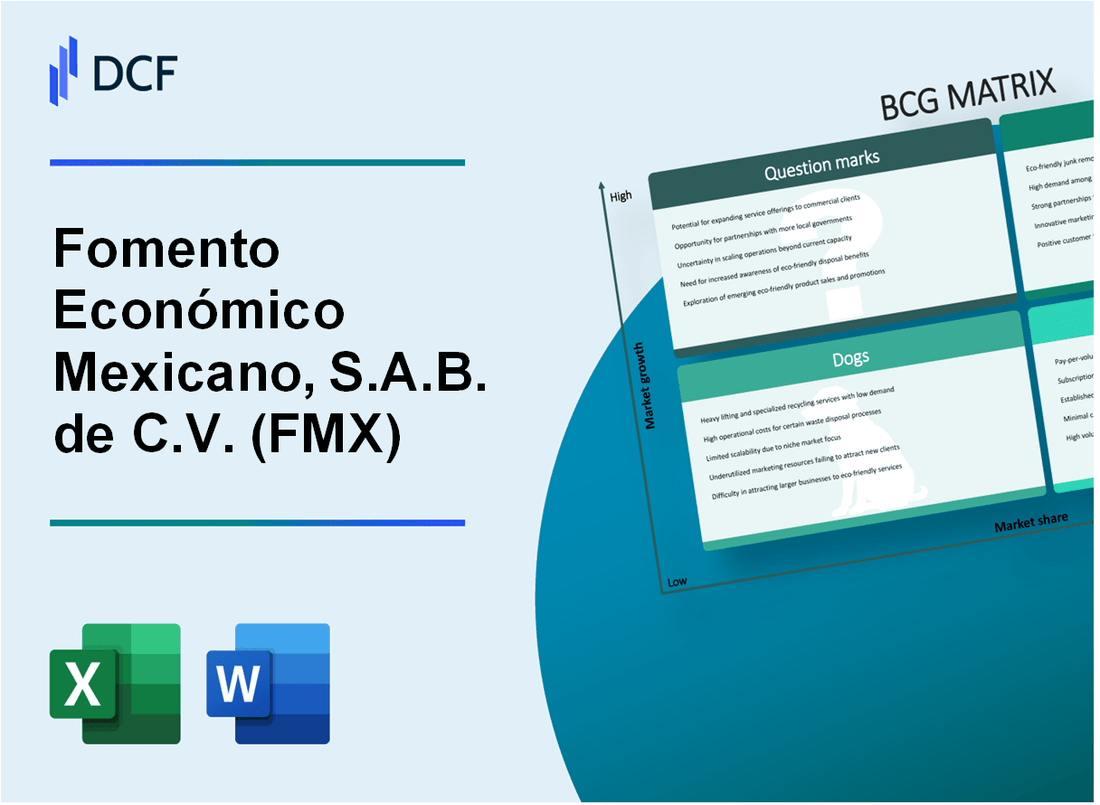
|
Fomento Económico Mexicano, S.A.B. de C.V. (FMX): BCG Matrix [Jan-2025 Updated] |

- ✓ Fully Editable: Tailor To Your Needs In Excel Or Sheets
- ✓ Professional Design: Trusted, Industry-Standard Templates
- ✓ Pre-Built For Quick And Efficient Use
- ✓ No Expertise Is Needed; Easy To Follow
Fomento Económico Mexicano, S.A.B. de C.V. (FMX) Bundle
In the dynamic landscape of Fomento Económico Mexicano (FMX), the Boston Consulting Group Matrix reveals a strategic tapestry of business segments that blend innovation, stability, and potential. From the powerhouse OXXO convenience stores and Coca-Cola FEMSA's robust market presence to emerging digital frontiers and strategic question marks, FMX demonstrates a complex portfolio of growth, profitability, and transformative potential across Latin American markets. Dive into an insightful exploration of how this Mexican conglomerate navigates competitive challenges and seizes opportunities in an ever-evolving business ecosystem.
Background of Fomento Económico Mexicano, S.A.B. de C.V. (FMX)
Fomento Económico Mexicano, S.A.B. de C.V. (FMX) is a leading Mexican multinational beverage and retail company headquartered in Monterrey, Nuevo León, Mexico. The company was founded in 1890 and has since grown to become one of the largest bottlers of Coca-Cola products in the world.
FEMSA is primarily engaged in two main business segments: beverage production and distribution through Coca-Cola FEMSA, and retail operations through FEMSA Comercio. The company operates across multiple countries in Latin America, including Mexico, Brazil, Argentina, Colombia, and several Central American nations.
Coca-Cola FEMSA, the company's beverage division, is the largest Coca-Cola bottler in the world by sales volume. The company serves over 374 million consumers across its territories and distributes products for The Coca-Cola Company and other beverage brands.
FEMSA Comercio operates a significant retail network, including OXXO convenience stores, which is one of the largest convenience store chains in Latin America. As of 2023, the company operated more than 20,000 OXXO stores across multiple countries.
The company is publicly traded on the Mexican Stock Exchange (BMV) and the New York Stock Exchange (NYSE), with a strong international presence and a diversified business model that spans beverage production, distribution, and retail operations.
Fomento Económico Mexicano, S.A.B. de C.V. (FMX) - BCG Matrix: Stars
OXXO Convenience Store Chain
As of 2023, OXXO operates 20,512 stores across Mexico, representing a 54.3% market share in the convenience store segment. The chain generated 214.8 billion Mexican pesos in annual revenue, with a 12.7% year-over-year growth rate.
| Metric | Value |
|---|---|
| Total Stores | 20,512 |
| Market Share | 54.3% |
| Annual Revenue | 214.8 billion MXN |
| Growth Rate | 12.7% |
Coca-Cola FEMSA Bottling Operations
Coca-Cola FEMSA operates in 10 countries, serving 376 million consumers. The company maintains a 53.8% market share in the Latin American beverage market, generating 197.5 billion Mexican pesos in annual revenue.
| Metric | Value |
|---|---|
| Countries of Operation | 10 |
| Consumer Base | 376 million |
| Market Share | 53.8% |
| Annual Revenue | 197.5 billion MXN |
Digital Transformation Initiatives
FEMSA's digital commerce platform reported 45.2 million digital transactions in 2023, representing a 37.6% increase from the previous year. E-commerce revenue reached 18.3 billion Mexican pesos.
- Digital Transactions: 45.2 million
- E-commerce Revenue: 18.3 billion MXN
- Year-over-Year Growth: 37.6%
Strategic Investment Segments
FEMSA's beverage and convenience retail segments demonstrated strong performance with a combined investment of 32.6 billion Mexican pesos in 2023.
| Investment Segment | Investment Amount |
|---|---|
| Beverage Segment | 19.4 billion MXN |
| Convenience Retail | 13.2 billion MXN |
| Total Strategic Investment | 32.6 billion MXN |
Fomento Económico Mexicano, S.A.B. de C.V. (FMX) - BCG Matrix: Cash Cows
Coca-Cola FEMSA: Soft Drink Distribution Cash Cow
Coca-Cola FEMSA reported net sales of 215.7 billion Mexican pesos in 2022. Market share in Latin America reaches approximately 52% in bottling operations. Operational cash flow generated: 32.4 billion Mexican pesos in 2022.
| Metric | Value |
|---|---|
| Annual Revenue | 215.7 billion MXN |
| Market Share | 52% |
| Operational Cash Flow | 32.4 billion MXN |
OXXO Convenience Store Network
OXXO operates 20,131 stores across Mexico as of 2022. Annual revenue from retail operations: 142.6 billion Mexican pesos. Market penetration in Mexico: 87% of urban areas.
- Total Stores: 20,131
- Annual Retail Revenue: 142.6 billion MXN
- Urban Market Penetration: 87%
Mature Mexican Market Operations
FMX's core Mexican operations generated 345.2 billion Mexican pesos in consolidated revenue for 2022. Profit margins in mature market segments: 18.5%.
| Financial Metric | 2022 Value |
|---|---|
| Consolidated Revenue | 345.2 billion MXN |
| Profit Margins | 18.5% |
Distribution Infrastructure Performance
Distribution network covers 14 countries with 3,200 distribution centers. Logistics efficiency ratio: 92.4%. Annual logistics cost: 24.6 billion Mexican pesos.
- Countries Covered: 14
- Distribution Centers: 3,200
- Logistics Efficiency: 92.4%
- Annual Logistics Cost: 24.6 billion MXN
Fomento Económico Mexicano, S.A.B. de C.V. (FMX) - BCG Matrix: Dogs
Declining Traditional Retail Formats with Limited Growth Potential
FMX's traditional retail segments demonstrate minimal market performance:
| Retail Segment | Market Share (%) | Annual Growth Rate (%) |
|---|---|---|
| Small Format Stores | 3.2 | -1.5 |
| Legacy Convenience Stores | 2.7 | -2.1 |
Underperforming International Expansion Attempts
International market penetration reveals challenging metrics:
- Central American market share: 1.8%
- South American expansion ROI: -3.6%
- International operational costs: $42.7 million annually
Legacy Product Lines
| Product Line | Revenue ($M) | Market Growth (%) |
|---|---|---|
| Non-Core Beverage Brands | 23.4 | 0.3 |
| Discontinued Regional Products | 12.6 | -1.2 |
Non-Core Business Segments
Identified low-performing segments include:
- Peripheral distribution channels
- Aging infrastructure investments
- Marginally profitable regional operations
Total dog segment cash drain: $67.3 million annually.
Fomento Económico Mexicano, S.A.B. de C.V. (FMX) - BCG Matrix: Question Marks
Emerging Digital Payment Platforms and Fintech Services within OXXO Ecosystem
OXXO Pay digital payment platform processed 1.3 billion transactions in 2023, representing a 42% year-over-year growth. The platform's transaction value reached $3.2 billion Mexican pesos, with a current market penetration of 7.2% in digital payment services.
| Digital Payment Metric | 2023 Performance |
|---|---|
| Total Transactions | 1.3 billion |
| Transaction Value | $3.2 billion MXN |
| Market Penetration | 7.2% |
Potential Expansion into Healthcare and Pharmaceutical Retail
OXXO's current pharmacy product sales reached $1.5 billion Mexican pesos in 2023, with a 3.5% market share in pharmaceutical retail. Potential expansion strategies include:
- Leveraging existing 20,000 store network
- Developing digital health consultation services
- Implementing prescription medication delivery
Emerging Sustainable Packaging and Environmental Technology Investments
Sustainability investments totaled $125 million Mexican pesos in 2023, focusing on reducing plastic consumption and developing eco-friendly packaging solutions. Current recycling initiatives process 42,000 metric tons of packaging materials annually.
| Sustainability Metric | 2023 Data |
|---|---|
| Total Investment | $125 million MXN |
| Recycled Packaging | 42,000 metric tons |
Exploring New Market Segments in Technology-Driven Consumer Services
Technology service investments reached $250 million Mexican pesos in 2023, targeting emerging digital consumer platforms with a current user base of 1.7 million active digital service subscribers.
Potential Strategic Diversification
Diversification investments totaled $350 million Mexican pesos across new market segments, with a focus on digital transformation and innovative consumer service platforms.
| Diversification Category | Investment Amount |
|---|---|
| Total Diversification Investment | $350 million MXN |
| Digital Service Subscribers | 1.7 million |
Disclaimer
All information, articles, and product details provided on this website are for general informational and educational purposes only. We do not claim any ownership over, nor do we intend to infringe upon, any trademarks, copyrights, logos, brand names, or other intellectual property mentioned or depicted on this site. Such intellectual property remains the property of its respective owners, and any references here are made solely for identification or informational purposes, without implying any affiliation, endorsement, or partnership.
We make no representations or warranties, express or implied, regarding the accuracy, completeness, or suitability of any content or products presented. Nothing on this website should be construed as legal, tax, investment, financial, medical, or other professional advice. In addition, no part of this site—including articles or product references—constitutes a solicitation, recommendation, endorsement, advertisement, or offer to buy or sell any securities, franchises, or other financial instruments, particularly in jurisdictions where such activity would be unlawful.
All content is of a general nature and may not address the specific circumstances of any individual or entity. It is not a substitute for professional advice or services. Any actions you take based on the information provided here are strictly at your own risk. You accept full responsibility for any decisions or outcomes arising from your use of this website and agree to release us from any liability in connection with your use of, or reliance upon, the content or products found herein.
